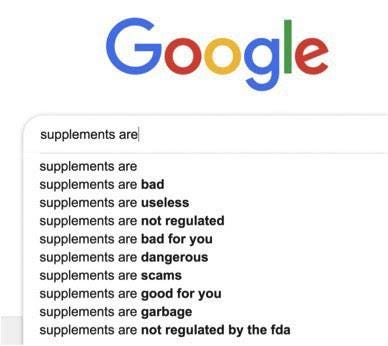
Pervasive ill health has stained the fabric of our global existence. Noncommunicable diseases (heart disease, cancer, stroke, diabetes, etc.) make up 7 of the world's top 10 causes of death, up from 4 in 2000. In America, nearly half suffer from at least one chronic disease, which are also responsible for 7 out of 10 deaths, or more than 1.7 million each year.
It’s clear that these topics are at the forefront of people's minds, as the sheer volume of health-related questions posed to Google daily tops 1 billion, or about 70,000 searches per minute.
Although Google isn’t primarily a health entity, it is the largest provider of online health information to the public, with its content controlled by search algorithms and advertising policies for both commercial and non-commercial information.
Google frequently adjusts its search algorithm to deliver the most relevant results. However, critics argue that these adjustments are often influenced by factors like bias and greed, rather than solely focusing on providing the most useful information to users.
This perception grew particularly strong after a significant algorithmic shift in 2019, which led to the removal of numerous top natural health websites from organic search results. Some of these websites experienced a loss of up to 99% of their traffic, significantly limiting people's access to important natural health information.
This means that the gatekeepers of the internet have censored and shadowed our health freedoms, by steering and manipulating us towards information they want us to see, rather than letting us evaluate content for ourselves.
Medicine Pushed Over Natural Health
The current state of the internet is shockingly chaotic, with natural health websites often facing loss of posting privileges, bans, or de-ranking, leading to the disappearance of content and the erosion of free choice.
In leading this charge, Google has essentially become a medicalized internet search, in tandem with big medicine. Its search algorithms favor content aligned with Google's ideology or partnered with pharmaceutical companies. While some doubt this partnership, it’s not hard to prove motive and proof.
Motive - Conventional health care is a for-profit business that depends on repeat business of chronic disease. And so advertisers ask Google to steer consumers towards a slew of medical products and services, or in other words - drug industry propaganda - from such sites as WebMD, Healthline, and Medical News Today as examples.
For Google, this was no capitulation, but rather a resolute spearheading of a medical movement. In fact, the company decisively took things to the next level with their “autocomplete” option, a list of "suggested" searches when typing in keywords. This approach is as brilliant as it is evil, effectively allowing Google to scrub previously high-ranking sites from their search results by offering alternative “suggestions” of what you should search for. An Epoch Times article shows a screen shot of a Google search done on September 1, 2019, starting with the words "supplements are."
Notice the list of autosuggestions contained mostly negative-biased searches placed into the user’s mind. They’re not only the opposite of what most people search for, but sometimes don’t search for at all — indicating that Google’s ostensibly objective feature is literally a propaganda device programming users to think thoughts they would never otherwise consider. (TheLibertyBeacon.com)
“This shows Google clearly doesn’t care about what you want to find, or what your intent is to find for health information — what matters is what they want you to see.
Proof - Google has significantly increased its involvement in the pharmaceutical sector over the last few years, with over 90 investments and partnerships. This includes collaboration with pharmaceutical companies such as Pfizer and biotech firms such as Cerevel Therapeutics and Colossal Biosciences.
It also leverages AI-powered tools to expedite drug discovery and is supportive of startups in the drug invention and design space, such as Valence Discovery. This positions them not only a drug company, but also as a formidable tool for Big Pharma in becoming a pay-to-play operation, containing a specific sociopolitical and economic agenda built directly into its search algorithms. (Lewrockwell.com)
What this means is that Google has actually morphed into its own pharmaceutical conglomerate, with a pharmaceutical division that's headed up by none other than the former chairman on global vaccine business for GlaxoSmithKline (GSK), a multinational drug giant that's repeatedly been implicated for criminal fraud.
In addition, Google has also now been exposed as a co-conspirator in illegal online drug sales. According to reports, Google has already raked in well over $1 billion from illegal online pharmacies which, unlike natural health content, are not being blocked from search results or removed from Google's autocomplete feature.
Google has already admitted that it plans to thwart its search engine results to favor the drugs and vaccines produced by its own pharmaceutical companies, including the offerings of Verily Life Sciences. This action is aided through its video-sharing website YouTube, by training algorithms to cut down on recommending videos that promote misinformation. And by creating "knowledge panels," Google provides their version of authoritative information when medical conditions are searched.
With Google as the dominant search engine, it has become a powerful tool for the pharmaceutical industry, acting as a gateway to information that mainly favors drug-based treatments. This has led some to view the relationship between Google and Big Pharma as a "massive racketeering scam" that prospers at the expense of people's health.
AI Treachery
The internet's bias towards pharmaceutical companies can only be described as an information warfare scenario. This pro-medicine bias became glaringly apparent during the COVID crisis, when Google and friends earned a ton of money from vaccinating whomever they could stick a needle into, while shutting down access to valid questions about vaccine safety that might damage their bottom line.
With the advent of artificial intelligence (AI), we are further transforming society and the potential for informational deception. Consumers need to be extra wary in a world where “trusted information” given by authoritative sources becomes the real misinformation. Google's artificial intelligence-powered chatbot Gemini, for example, has been criticized for showing a clear bias towards natural health websites.
Google believes that anything running counter to medical views is “misinformation”. It’s essentially telling consumers that what constitutes true health involves pills and needles, while smearing credible sources, hiding information, and vaporizing sovereignty. It’s a cloak and daggers situation. All sickness. No health.
Don’t blindly trust Google to give you trustworthy content. Stay informed and independent by following the sources you trust directly.
If you want to stay updated on the latest health information directly, you can subscribe to my official mailing list here.
This ensures that you’ll get the latest information delivered directly to your inbox, without giving companies like Google the chance to influence the kind of information you can access.




















Give me back accurate Google searches! I could always find what I was researching, now it's just BS stuffed down our throats. Scary where it's going!